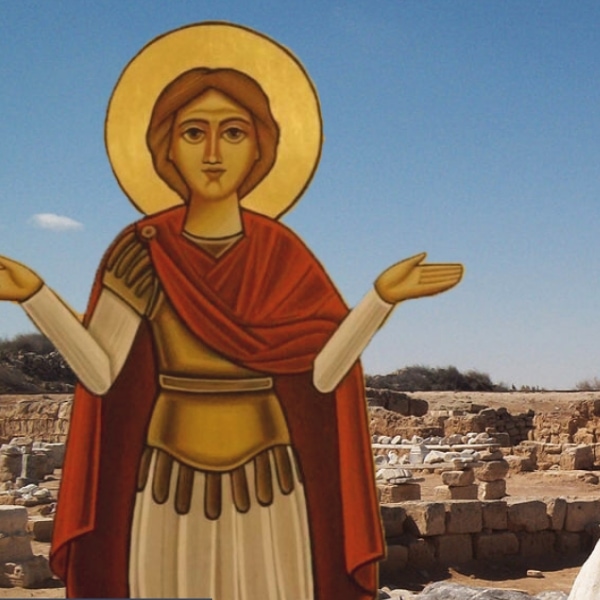
+
St. Mena the Miraculous
Odexius, who was a governor and his wife Ofomia did not have children. Ofomia prayed fervently,with an oppressed heart before the Icon of St. Mary for a child. Suddenly, she hard a voice form the Icon saying, “Amen”. So she realized that St. Mary heard her. God gave them a child and they named him “Mena”, as Ofomia heard from the Icon of St. May. The little child Mena loved the church. There he learned, served, and took of the Holy Communion. That is why he wanted to live with God forever.
As Mena’s parents passed away, he had to replace his father in his position. Therefore he joined the army where he was brave, honest, strong willed, and the grace of Christ shone upon him. Every body loved him.
Mena loved Christ so much that he left the army and the world, and gave all his possessions to the poor. He left to the wilderness and there he led a heavenly life with God. One day, while Mena was praying, he heard an Angel saying, “If you confess your faith when you return to town, you will come to heaven and
have these crowns.”
Mena left the wilderness, went to the city, and spoke to the king in front to all saying, I am Christian, and I believe in the God of heaven and earth, the Lord Jesus Christ.” The king ordered his soldiers to inflict severe pains on Mena, persecuting him with various tortures, but they were unsuccessful. With Jesus Christ inside him, Mena stood firm in his faith in Jesus Christ. The king ordered his execution. Mena was filled with joy when he heard this news. When he was martyred he received three crowns in heaven: one for his celibacy, another for his life in the wilderness, and the third for his martyrdom. The fame St. Mena spread throughout Europe: France, Italy, Ireland, Germany, etc., as well as the Middle East, after Emperor Xenon built a very magnificent city in his burial place (Mayrout, Egypt), to which pilgrims flocked from many countries to receive the blessings of the saint. Porcelain containers were found in these countries on which the image of St. Mena and his name were engraved. This city was later destroyed by the Arabs who came from Makka in Arabia and from Libya during the 9th & 10th centuries.
Though this city was destroyed by the Islamic barbarians, St. Mena’s fame continued to spread throughout history, and he was entitled “The Miraculous” for the many miracles God performed through him. The Eastern Orthodox Church considers him a great martyr and saint as is witnessed by Patriarch Christophoros who stated the following: “Born in Egypt, St. Mena died a martyr in Colyeon in Asia Minor according to his church history. In the 3rd century AD his remains were transferred by pious Christians to Alexandria and were buried in the Western Desert in the vicinity of El Alamain. Since then, this city has become a universal place of pilgrimage for the whole Christian world. The recent military operation took place in the Western Desert close to St. Mena’s burial place and we are entitled to believe that his blessings contributed to the victory of the Allies and the crushing defeat of the Axes in the Battle of El Alamain.”
Signed: Christopher, Patriarch of the Greek Orthodox Church, Cairo, 11/11/1942. One of the most recent miracles God performed through St. Mena was in the church named after his name in Bani-Mazr, Menia, Egypt. When the Moslem brotherhood and fanatic members burned and destroyed many churches in Egypt, on 8/14/2013 about 3000-4000 members attacked his church in BaniMazar to burn it with Molotov concoctions, but miraculously the flames were extinguished before they reached the church floor. The church was not burned and remained unharmed! May the blessings of St. Mena be with us. Amen. Martyrdom of St. Mena Hator 25, 1730 AM November 24, 2013 AD
+ Fr. Marcos Girgis
Our church in RI requests your support to fulfill its needs through prayers and contributions. May God reward you in heaven and in this age also.“If a man shall gain the whole world and lose his own soul, what is the value of this vanishing world?” (Doxology of St. Mena)


